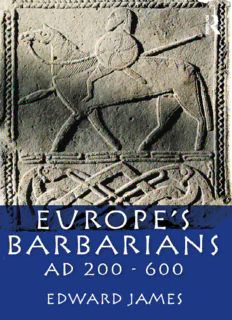
Europe’s Barbarians, AD 200–600 PDF
Preview Europe’s Barbarians, AD 200–600
EUROPE’S BARBARIANS, AD 200–600 The Medieval World Series editor: Julia Smith, The University of Glasgow Alfred the Great Richard Abels The Western Mediterranean Kingdom David Abulafia The Fourth Crusade Michael Angold The Cathars Malcolm Barber The Godwins Frank Barlow Philip Augustus Jim Bradbury Medieval Canon Law J. A. Brundage Crime in Medieval Europe Trevor Dean Charles I of Anjou Jean Dunbabin The Age of Charles Martel Paul Fouracre Margery Kempe A. E. Goodman Edward the Black Prince David Green Bastard Feudalism M. Hicks The Formation of English Common Law John Hudson The Mongols and the West Peter Jackson Europe’s Barbarians, AD 200–600 Edward James Cnut K. Lawson The Age of Robert Guiscard Graham Loud The English Church, 940–1154 H. R. Loyn Justinian J. Moorhead Ambrose John Moorhead The Devil’s World Andrew P. Roach The Reign of Richard Lionheart Ralph Turner/Richard Heiser The Welsh Princes Roger Turvey English Noblewomen in the Later Middle Ages J. Ward EUROPE’S BARBARIANS, AD 200–600 EDWARD JAMES First published 2009 by Pearson Education Limited Published 2014 by Routledge 2 Park Square, Milton Park, Abingdon, Oxon OX14 4RN 711 Third Avenue, New York, NY, 10017, USA Routledge is an imprint of the Taylor & Francis Group, an informa business Copyright © 2009 Taylor & Francis. All rights reserved. The right of Edward James to be identified as author of this work has been asserted by him in accordance with the Copyright, Designs and Patents Act 1988. Notices Knowledge and best practice in this field are constantly changing. As new research and experience broaden our understanding, changes in research methods, professional practices, or medical treatment may become necessary. Practitioners and researchers must always rely on their own experience and knowledge in evaluating and using any information, methods, compounds, or experiments described herein. In using such information or methods they should be mindful of their own safety and the safety of others, including parties for whom they have a professional responsibility. To the fullest extent of the law, neither the Publisher nor the authors, contributors, or editors, assume any liability for any injury and/or damage to persons or property as a matter of products liability, negligence or otherwise, or from any use or operation of any methods, products, instructions, or ideas contained in the material herein. British Library Cataloguing in Publication Data A CIP catalogue record for this book can be obtained from the British Library Library of Congress Cataloging in Publication Data James, Edward, 1947— Europe’s barbarians, AD 200–600 / Edward James. – 1st ed. p. cm. Includes bibliographical references and index. ISBN 978-0-582-77296-0 (pbk.) 1. Rome–History–Germanic Invasions, 3rd-6th centuries. 2. Germanic peoples–Rome–History. 3. Germanic peoples–Europe–History. 4. Roman provinces–History. 5. Europe–History–To 476. 6. Europe–History–476-1492. 7. Rome–Civilization–Foreign influences. 8. Europe–Ethnic relations. 9. Rome–Ethnic relations. I.Title. DG312.J365 2009 937′.004–dc22 2009002079 A CIP catalog record for this book can be obtained from the Library of Congress ISBN: 978-0-582-77296-0 (pbk) ISBN: 978-0-582-77296-0 (pbk) Set by 35 in 10.5/13pt Galliard CONTENTS SERIES EDITOR’S PREFACE PUBLISHER’S ACKNOWLEDGEMENTS AUTHOR’S ACKNOWLEDGEMENTS ABBREVIATIONS chapter one WHO ARE THE BARBARIANS? chapter two THE BARBARIANS BEFORE AD 376 chapter three THE BARBARIANS FROM 376 TO 476 chapter four THE BARBARIANS AFTER 476 chapter five ETHNICITY, ETHNOGENESIS AND IDENTITY chapter six THE BARBARIANS AT HOME chapter BARBARIANS IN ROMAN EMPLOYMENT seven chapter eight BARBARIANS ON THE MOVE chapter nine ASSIMILATION, ACCULTURATION AND ACCOMMODATION chapter ten FROM PAGANISMS TO CHRISTIANITIES chapter KINGDOM, KINGSHIP AND LAW eleven chapter CONCLUSIONS twelve NOTES BIBLIOGRAPHY INDEX SERIES EDITOR’S PREFACE W hy did the Western Roman Empire end? How and why did medieval Europe begin? These perennially important questions lie at the heart of some of the most vibrant historical scholarship currently being conducted. While some historians have breathed new life into the paradigm of ‘decline and fall’, others argue for a complex process of ‘transformation’ whether gradual or abrupt, peaceful or violent. What no one disputes is that barbarians from outside the boundaries of the Roman Empire played a part. But what part? Who were they anyway? How many were there? What were they like? In this book, Edward James guides the reader through these debates with a sure interpretive touch and an authoritative grasp of all the evidence. He tells this story with a difference. Its central characters are never the Romans but always the barbarians. His theme is what the barbarians contributed to European history, and his geographical scope extends from Ireland and Scandinavia to the Mediterranean and the Danube basin. On this broad canvas, he takes account of a large number of different peoples, not only those who remain household names such as the Goths, Franks, Saxons or Picts, but also such half-forgotten groups as the Heruls, or Sarmatians – and he even mentions the Ohtgaga and Noxgaga, whose names only occurs once in the historical record. James explains how new kingdoms emerged on Roman soil, taking their identity from barbarian armies and their leaders. His account balances narrative (Chapters 2–4) with analytic overviews (Chapters 5–12) of issues central to current debates: the changing character of late Roman provincial societies; the nature of early medieval ethnic identities; the multiple interactions of Romans and barbarians besides warfare; the problem of how many people may have migrated, and how far. The nature of barbarian kingship and governance, and the role of religion in political change and cultural identity also receive full attention. He closes by demonstrating that the barbarians’ contribution to Europe’s political mythologies remains potent.
Description: